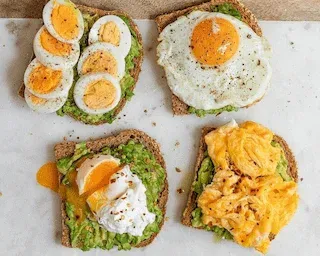Are Avocado Toasts So Healthy?
Losing weight with avocado, this fatty food, is quite possible, provided you are vigilant about the amount of carbohydrates you ingest. It is also an extremely tasty and little frustrating diet. Here's everything you need to know about the avocado diet.
Understand the weight loss mechanism
Fats from foods and carbohydrates are macronutrients, that is, they can turn into fat in our body. The peculiarity of fats in foods, unlike carbohydrates, is that they can only become body fats under the impulse of carbohydrates.
Here's what happens in the body:
When you digest food, it passes the intestinal barrier and ends up in the blood.
Depending on the amount of carbohydrates in the meal, this generates a more or less significant spike in blood sugar.
Then comes a spike in insulin that marks the starting point of weight gain: digested carbohydrates and fats are then stored.
To avoid weight gain, it is therefore necessary to take care to eat few carbohydrates because if you do not raise blood sugar, you will not store.
It is for this reason that you can lose weight by eating avocados: they are very low in carbohydrates. Thus, even if they are high in fat, there will be no weight gain as long as you respect the right combinations in the same meal.
Introduce avocado at each meal to lose weight serenely
Losing weight with avocado brings many benefits:
A feeling of satiety: avocado is rich in fats, especially unsaturated fatty acids which, in addition to sustenance, are good for cardiovascular health. This feeling of satiety is important so as not to compromise a diet. Hunger is one of the worst enemies to the success of a regime.
A significant contribution of vitamins and minerals: avocado is rich in vitamin E, B vitamins, provitamin A and C, potassium, magnesium, iron, copper and manganese. It also carries fibers that are good for transit regulation.
Organoleptic satisfaction: avocado is a generally appreciated food that lends itself to many recipes and culinary techniques. The web is full of avocado recipes.
Count between 1/2 and 1 avocado per meal (breakfast, lunch and dinner). The amount is to be determined according to your hunger and satiety (which corresponds to the moment when hunger stops). You can consume it:
in smoothie form;
in the form of cream or puree;
as a salad ingredient;
in vinaigrette or accompanied by mayonnaise.
Pair avocado with other foods in your diet
If the avocado alone is a slimming partner, the whole question is how to combine it with other foods to be able to meet all your needs while initiating weight loss.
Here is an example of a typical menu to lose weight with avocado:
Breakfast: avocado-cucumber smoothie 1 boiled egg and 1 handful of almonds.
Lunch: guacamole on endive leaves, pan-fried salmon pavé, dessert cream made with half an avocado.
Dinner: mixed salad with grilled bacon oak leaf salad pine nuts of avocado slices and a dark chocolate mousse with no added sugar for dessert.
Be free about your fat intake
When you go on an avocado diet, you do not count the fats ingested since you go on a diet high in fat and low in carbohydrates, otherwise called low carb high fat (LCHF). You can then introduce into your meals:
seeds or oilseeds such as almonds, walnuts, hazelnuts, chocolate, chia, or flax seeds, for example;
vegetable oils such as coconut oil, olive oil, walnut oil, hazelnut oil, rapeseed oil, or flaxseed oil, among others;
animal fats such as lard, duck fat, goose fat, cod liver oil;
butter or fresh cream even whole;
fatty meats, such as pork or duck, and fatty fish, such as salmon, sardines, mackerel, tuna, or eggs.
Bet on protein to accompany the avocado
In addition to avocado, it is important to consume important sources of protein to spare your muscles always put to the test during weight loss, but also to strengthen the feeling of satiety brought by fats.
Morning, noon, and evening, consume the choice:
eggs;
fish or other fishery products;
meat, especially poultry;
tofu, tempeh, textured soy protein, or gluten-based seitan.
Monitor your carbohydrate intake
On the other hand, the intake of sugars is to be avoided as much as possible so as not to cause blood sugar spikes responsible for the mechanisms of weight gain. Remove from your diet:
bread;
starchy foods and starchy vegetables, such as potatoes;
fruits except for red berries, lemon, and carambola;
sugar and sweet products such as cakes.
















